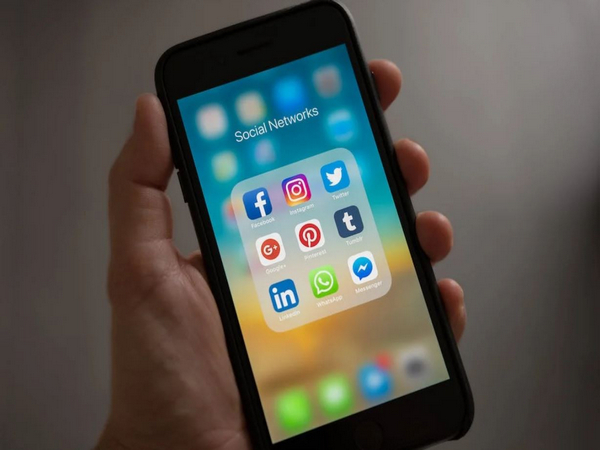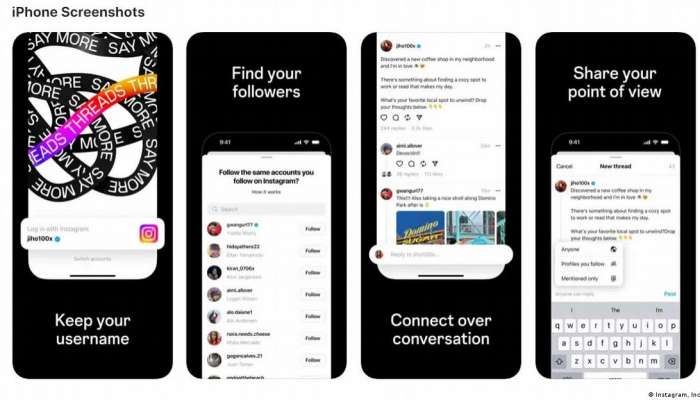

At the end of June, Twitter's Elon Musk and Meta's Mark Zuckerberg challenged each other to a cage fight.
No one knows whether they will actually strap on the gloves, but Thursday marked the advent of a showdown between their digital platforms. It was when users outside of the European Union start downloading Threads, Meta's new, free social media platform from app stores.
On Threads, they can share opinions, discuss, like and comment — exactly what they have been doing on Twitter. Some are already expressing their enthusiasm.
No more chirps from Elon Musk?
Meanwhile, Twitter has been struggling for a while. There are estimates that the platform could lose more than 32 million users by the next year from over 360 million in 2022, and the estimates don't even take into consideration the latest restrictions imposed on unverified users.
Mannheim-based media scholar Phillipp Müller attributes many reasons to Twitter's troubles.
"Musk's political statements as well as the symbolic reactivation of Donald Trump's account are red flags to many users and leave them disappointed," he says.
Also, the tech billionaire's cost-cutting actions have irritated many. Unpopular measures have included dismissing 80% of Twitter's staff which led to several problems with core functions of the app, as well as introducing payment models such as Twitter Blue and, most recently, limiting to only verified users the use of Tweetdeck — used by many businesses and news organizations to easily monitor content.
Just a few days ago, Musk capped the number of tweets that can be read for free at 1,000 per day, and only 500 for new accounts. "This clashes with the fundamental idea of a social media platform," Müller told DW.
Elon Musk in front of a black and white striped backdrop.
Can Threads fill a gap in the market?
There are a handful of alternatives to Twitter such as Mastodon, T2, Bluesky, and Trump's notorious Truth Social. However, these platforms have struggled to build a broad user base.
Mastodon, for example, is an ad-free, non-profit social network, making it unattractive to advertisers, explains the Mannheim-based expert. "The market has been lacking a large, commercially oriented alternative to Twitter," Müller says.
This is exactly where Threads has a head start.
Threads is the latest addition to Meta's large app family comprising Instagram, Facebook, Messenger, and Whatsapp. Thus, the tech company can rely on its extensive knowledge of how to attract users.
Moreover, the company boasts of a huge cash pile — unlike Twitter, which was struggling with financial problems even before Musk took charge.
Threads plans to leverage the popularity of Instagram which has over 1 billion users. Instagram users can log into Threads using their existing Instagram accounts and import their entire network of followers on the go, the company said.
Mark Zuckerberg's obstacles
Yet, this advantage also prompts Müller to doubt whether Instagram is the most suitable to challenge Twitter's dominance. In terms of content, both platforms differ from one another.
"On Instagram, there's a lot of positive communication which is not nearly as political. Twitter, on the other hand, is a medium for professional communication. Depending on the platform, people arguably follow very different accounts," Müller said.
In the past, Meta has tried to imitate popular social media platforms, but with mixed results.
They first developed an app named "Threads" as early as 2019. It was supposed to allow users to privately share photos, videos, and messages, as on Snapchat, but it flopped.
However, Reels, the short video format that Meta launched inspired by the success of TikTok, is growing steadily.
Then there are regulatory hurdles. Meta has postponed the launch of Threads in the EU due to privacy issues and users' personal information Meta is set to collect. On Tuesday, the top EU court sided with Germany's anti-cartel watchdog in an antitrust dispute with Meta.
The most crucial question remains: How will users react? German digital expert Dennis Horn says people are most prone to switching platforms when their peers do so as well. So ultimately, the future of Twitter will depend on how many users cling to Threads to discuss politics and society.